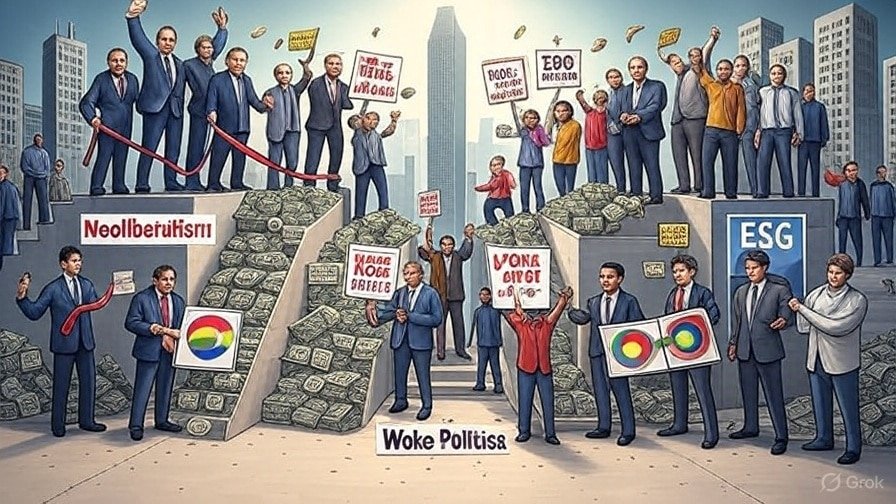How Woke Politics Took Hold
How did we get from class struggle and unions to boardrooms waving rainbow flags and schools debating identity politics? The story is not simple, but it has a clear arc. Step by step, over the last half-century, economic power, political choices, and cultural shifts have combined to produce what we now call woke politics.
This article ties together the key turning points: neoliberal economics, the Occupy Wall Street protests, the rise of ESG, and the shift from class to identity.
Table of contents
The Neoliberal Foundation
In the 1970s and 1980s, neoliberalism rose to dominance. Governments cut welfare, privatised industries, and opened markets. The result was more power for corporations and investors, and less for unions or the state.
While supporters praised efficiency and growth, critics pointed to widening inequality. Importantly, neoliberalism tilted the balance of power. Businesses were no longer just economic actors; they became political and cultural players.
Occupy Wall Street: A Missed Chance
In 2011, the Occupy Wall Street protests captured global attention with the slogan “We are the 99%.” Anger at corporate greed after the financial crash seemed ready to spark real reform.
Yet the system adapted. The protests lacked clear demands, and Wall Street survived untouched. What changed instead was the cultural battlefield. Economic inequality remained, but debates shifted towards identity, diversity, and symbolic inclusion.
ESG: Business Adopts the Language of Virtue
After Occupy, corporations turned to ESG — Environmental, Social, Governance policies. On paper, this meant responsibility. In practice, it often meant branding. Big firms used ESG to appear progressive, attract investors, and deflect criticism.
While some positive steps came from this, ESG created heavy reporting burdens for smaller businesses. It also gave corporations even more cultural authority, allowing them to shape social debates in ways that suited their interests.
From Class to Identity
Traditionally, politics centred on class conflict: workers versus elites. But over time, identity politics rose. Race, gender, and sexuality became the new front lines of debate. These causes mattered — discrimination is real — but the shift came with side-effects.
Class issues like stagnant wages and housing costs were often pushed aside. Identity struggles were easier for corporations to champion. They required statements and campaigns, not wealth redistribution.
The Result: Woke Politics
By the 2020s, a new order was in place. Neoliberal systems gave corporations dominance. Occupy showed how easily economic revolt could be redirected. ESG turned activism into policy. And identity politics overshadowed class struggle.
Woke politics became the language of our age: a blend of progressive ideals and corporate power. It offers inclusion and recognition, but it also distracts from the deeper inequalities that remain unresolved.
The Question Going Forward
Has woke politics created a fairer society, or simply a more divided one? Do identity campaigns empower people, or do they fragment solidarity? Most of all, can we still talk about class, wealth, and power without being drowned out by culture wars?
The challenge is to see through the slogans, recognise the forces at play, and decide what kind of society we want to build next.
Frequently Asked Questions
What does “woke politics” mean?
It describes today’s mix of progressive social causes and corporate power. The focus is on identity and inclusion, often promoted by businesses through diversity campaigns and ESG policies.
How did neoliberalism lead to woke politics?
By giving corporations more power. Instead of tackling inequality, many firms embraced social causes. This let them look progressive while protecting their influence.
Why was Occupy Wall Street important?
It exposed anger at inequality after the 2008 crash. But the movement faded without reform. Instead, politics shifted from class to cultural battles.
What role does ESG play?
ESG gave businesses a way to showcase responsibility. But it often worked as branding, creating costs for smaller firms while giving large corporations more say in social issues.
How does identity politics relate to class struggle?
Both deal with unfairness, but in different ways. Identity politics focuses on recognition of groups; class struggle on wealth and power. Today, identity often overshadows class, leaving inequality unresolved.



